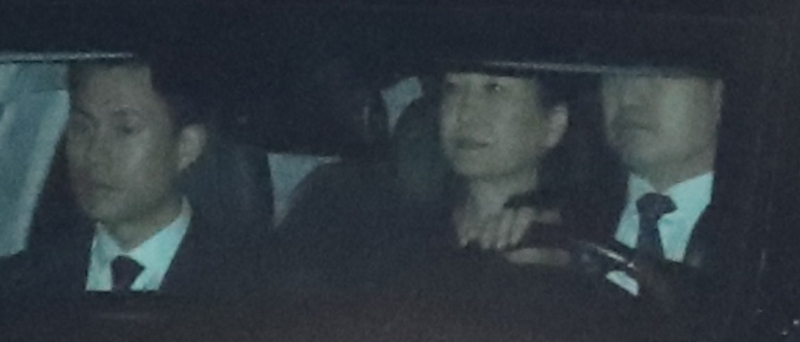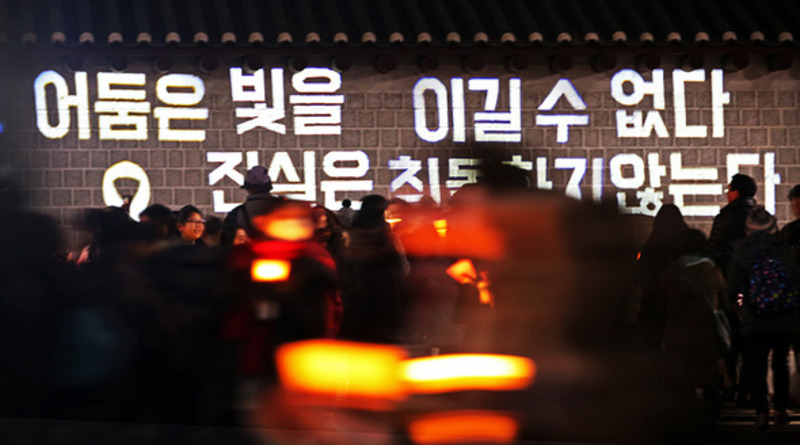 |
|
박근혜 전 대통령이 헌법재판소의 파면 선고가 내려진 뒤 이틀이 지난 12일 청와대를 떠나고 있다. 연합뉴스
|
Weconomy | 김재수의 갑을 경제학
 |
|
박근혜 전 대통령이 헌법재판소의 파면 선고가 내려진 뒤 이틀이 지난 12일 청와대를 떠나고 있다. 연합뉴스
|
 |
|
미국 인디애나-퍼듀대 교수
|
 |
|
도널드 트럼프 미국 대통령의 국정 지지도가 40%도 채 안 되는 역대 최저로 나타났다. 퓨리서치센터가 지난 7∼12일(현지시각) 미 전국 성인남녀 1천503명을 대상으로 실시해 16일 공개한 여론조사 결과에 따르면 트럼프 대통령의 국정 지지도는 39%에 그쳤다. 역대 대통령들의 취임 첫해 2월 국정 지지도는 버락 오바마 64%, 조지 W. 부시(아들 부시) 53%, 빌 클린턴 56%, 조지 H.W. 부시(아버지 부시) 63%, 로널드 레이건 55% 등 모두 50%를 웃돌았다. 사진은 트럼프 대통령이 이날 백악관에서 기자회견 하는 모습. 연합뉴스
|
 |
|
제14차 범국민행동의 날 촛불집회가 열린 4일 저녁 서울 종로구 광화문광장에서 참석한 시민들이 청와대 방면으로 행진을 하고 있다. 이정용 선임기자 lee312@hani.co.kr
|
거짓은 참을 이길 수 없다.
진실은 침몰하지 않는다.
우리는 포기하지 않는다. 끼리끼리 흩어져 있던 이들이 광장에 모여들어 촛불을 들었습니다. 사라지지 않을 것만 같던 어둠도 한 자락 이겨냈습니다. 지난 몇 달 우리는 ‘거꾸로 강을 거슬러 오르는 저 힘찬 연어들’이었습니다. 진실을 포기하지 않겠다는 노래를 부르며, 탈진실이라는 시대 흐름을 역행하며 살아냈습니다. 촛불 시민들께 존경을 드립니다. 대통령 선거가 다가옵니다. 멋진 슬로건과 홍보 비디오가 등장할 것입니다. 저는 너무 믿지 않으려고 노력할 것입니다. 우리는 ‘경제 대통령, 747 공약’을 굳게 믿었고, ‘내 꿈이 이루어지는 나라, 국민행복, 준비된 여성대통령’도 굳게 믿지 않았습니까. 누구를 지지하든, 확증 편향과 진영논리의 포로가 되지 않으려고 노력해 보겠습니다. 불확실성이 높을 때는 여러 개의 진실이 공존할 수 있다는 가능성도 인정하고 포용해 보려고 합니다. 혼밥하고 끼리끼리만 모이지 않고, 계속 광장 주변을 서성이며 연대감을 확인하고 싶습니다. 깨어있는 시민 의식만큼 민주주의는 진보하지 않습니까. 김재수 미국 인디애나 퍼듀대 교수
◎관련논문
① Babcock, Linda, George Loewenstein, Samuel Issacharoff, and Colin Camerer. 1995. “Biased Judgments of Fairness in Bargaining.” American Economic Review 85 (5): 1337–43.
② Rabin, Matthew, and Joel L. Schrag. 1999. “First Impressions Matter: A Model of Confirmatory Bias.” Quarterly Journal of Economics 114 (1): 37–82.
③ Lord, Charles G., Lee Ross, and Mark R. Lepper. 1979. “Biased Assimilation and Attitude Polarization: The Effects of Prior Theories on Subsequently Considered Evidence.” Journal of Personality and Social Psychology 37 (11): 2098–109.
④ Eil, David, and Justin M. Rao. 2011. “The Good News–Bad News Effect: Asymmetric Processing of Objective Information about Yourself.” American Economic Journal: Microeconomics 3 (2): 114–38.
⑤ Sunstein, Cass R., Sebastian Bobadilla-Suarez, Stephanie C. Lazzaro, and Tali Sharot. 2016. “How People Update Beliefs about Climate Change: Good News and Bad News.” John M. Olin Center Faculty Discussion Paper 883
⑥ Kahan, Dan M., et al. 2012. “The Polarizing Impact of Science Literacy and Numeracy on Perceived Climate Change Risks.” Nature Climate Change 2: 732–35.
⑦ Nyhan, Brendan, and Jason Reifler. 2010. “When Corrections Fail: The Persistence of Political Misperceptions.” Political Behavior, 32(2): 303-330.
⑧ Golman, Russell, David Hagmann, and George Loewenstein. 2017. “Information Avoidance.” Journal of Economic Literature, 55(1): 96-135.
⑨ Scherer, Aaron M., Paul D. Windschitl, and Andrew R. Smith. 2013. “Hope to Be Right: Biased Information Seeking following Arbitrary and Informed Predictions.” Journal of Experimental Social Psychology 49 (1): 106–12.
① Babcock, Linda, George Loewenstein, Samuel Issacharoff, and Colin Camerer. 1995. “Biased Judgments of Fairness in Bargaining.” American Economic Review 85 (5): 1337–43.
② Rabin, Matthew, and Joel L. Schrag. 1999. “First Impressions Matter: A Model of Confirmatory Bias.” Quarterly Journal of Economics 114 (1): 37–82.
③ Lord, Charles G., Lee Ross, and Mark R. Lepper. 1979. “Biased Assimilation and Attitude Polarization: The Effects of Prior Theories on Subsequently Considered Evidence.” Journal of Personality and Social Psychology 37 (11): 2098–109.
④ Eil, David, and Justin M. Rao. 2011. “The Good News–Bad News Effect: Asymmetric Processing of Objective Information about Yourself.” American Economic Journal: Microeconomics 3 (2): 114–38.
⑤ Sunstein, Cass R., Sebastian Bobadilla-Suarez, Stephanie C. Lazzaro, and Tali Sharot. 2016. “How People Update Beliefs about Climate Change: Good News and Bad News.” John M. Olin Center Faculty Discussion Paper 883
⑥ Kahan, Dan M., et al. 2012. “The Polarizing Impact of Science Literacy and Numeracy on Perceived Climate Change Risks.” Nature Climate Change 2: 732–35.
⑦ Nyhan, Brendan, and Jason Reifler. 2010. “When Corrections Fail: The Persistence of Political Misperceptions.” Political Behavior, 32(2): 303-330.
⑧ Golman, Russell, David Hagmann, and George Loewenstein. 2017. “Information Avoidance.” Journal of Economic Literature, 55(1): 96-135.
⑨ Scherer, Aaron M., Paul D. Windschitl, and Andrew R. Smith. 2013. “Hope to Be Right: Biased Information Seeking following Arbitrary and Informed Predictions.” Journal of Experimental Social Psychology 49 (1): 106–12.
◎ Weconomy 페이스북 바로가기: https://www.facebook.com/econohani/


기사공유하기